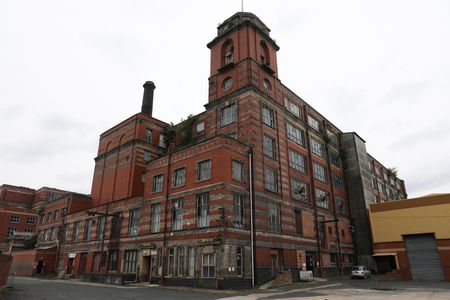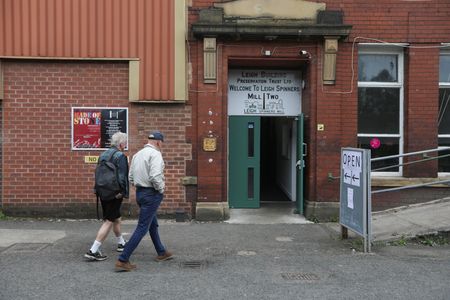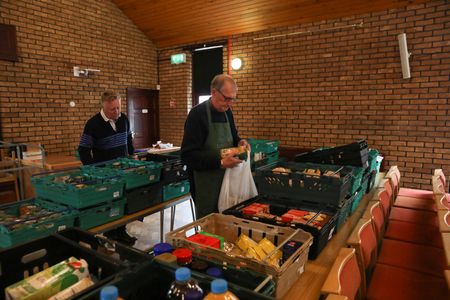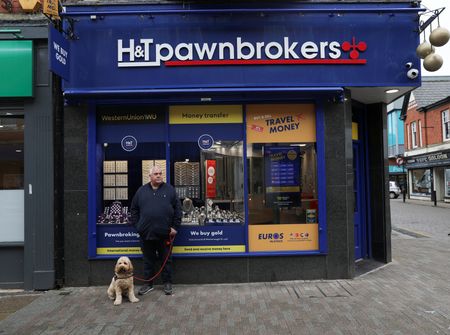By Andrew MacAskill and Andy Bruce
LEIGH, England (Reuters) – After the once-thriving coal and manufacturing town of Leigh in northern England voted for the Conservative Party for the first time at the last general election, locals hoped for a promised transformation of the area.
More than four years later and with three days until the next national election, the signs of economic hardship and neglect persist.
Many shops on Leigh’s main shopping street were boarded up. Mobile homes dominated the town’s main car park, and a handful of men wrapped in sleeping bags searched in bins for food.
At the 2019 general election, then-prime minister Boris Johnson persuaded voters in dozens of towns like Leigh in northern and central England to elect a Conservative candidate for the first time, smashing the opposition Labour party’s so-called Red Wall of support in the country’s former industrial heartland. Leigh registered the largest swing away from Labour in the country.
In part, Johnson’s pledge to “get Brexit done” resonated with an electorate weary of Britain’s slow negotiations to withdraw from the EU.
But voters were also swayed by his promises of “levelling up” – a policy of investing in local projects to regenerate deprived areas.
Many of them now feel betrayed. The Conservatives are expected to lose all the seats in those areas in Thursday’s vote, helping Labour to a landslide victory, polls predict.
Leigh was assigned 32 million pounds ($40 million) to redevelop the town centre under the plan.
But more than 99% of those funds have not been spent, Reuters has found – snared in local political and bureaucratic quarrels that encapsulate Britain’s poor record of public investment.
Interviews with nearly 50 people, including voters, election candidates, councillors and officials, highlighted the flaws within the political system for allocating money to local areas.
Leigh’s first bid for ‘levelling up’ funding was rejected in January last year by the national government because of a dispute between Labour local officials and the Conservative member of parliament over how the money should be spent. A second bid was successful in November.
The bulk of the 32 million was only disbursed in the last few months. Wigan Council, which is in charge of Leigh, has so far spent about 50,000 pounds, or less than 0.2% of those funds, local officials told Reuters.
Other areas of Britain show a similar pattern. Nationally, just over 10% of the more than 10-billion-pound local regeneration funds has been spent, parliament’s public accounts committee said in March. Overly complicated bidding rules and a lack of transparency were among the reasons more money was not spent, it noted.
“We were promised the earth and given nothing,” said John Riedyard, an 82-year-old former textile factory worker, referring to the 2019 election when he voted for the Conservatives.
Of 44 voters who spoke to Reuters in Leigh, only one planned to vote Conservative this time around.
MONEY NOT SPENT
Starting in 2020, the Conservative government pledged more than 10.4 billion pounds ($13.1 billion) to reduce regional inequality in Britain, the most economically imbalanced large European country.
After the government published its plan for levelling up in early 2022, the Institute for Government – a non-partisan think tank – said that, while the ambition was laudable, the plan “will not reduce regional inequality.” It said many of the metrics were unambitious, unrealistic or vague.
The Conservative government has blamed the COVID-19 pandemic and high inflation for delays in projects, and said it would be fairer to judge the success of the policy over a decade.
Michael Winstanley, the Conservative candidate in Leigh, said he “would have liked to have seen more” money spent on regenerating the town, but blames the Labour-run local council for failing to have a clear plan.
The council said it was “disappointed” to miss out on its initial bid and its aim will be to spend the money in the coming years to create a town centre that “preserves our town’s proud past and embraces the opportunities of the future”.
Jo Platt, the Leigh candidate for the opposition Labour Party, who is predicted by polls to win on Thursday, said people were “angry and rightly so”.
“People feel let down five years on and things have got visibly worse.”
But she said a Labour government should focus on tackling underlying social problems in places like Leigh – such as law and order, drug and alcohol abuse, and a lack of mental health services – rather than just directing money from central government to redo a shopping street.
The town of 45,000 people had the lowest social mobility chances in England for children in their early years, according to a 2018 parliamentary report.
“We need to get to the root cause of social problems rather than just saying you can have some money to make your town look pretty,” she said. “And in Leigh, we have not even got that.”
Labour said if it wins Thursday’s election it will prioritise tackling the regional inequalities by giving more powers to local leaders, but would drop the term “levelling up” to mark a break with Conservative policies.
Labour’s deputy leader Angela Rayner last month called the levelling-up pledge a “phoney gimmick”.
DEAD TOWN
Riedyard grew up in postwar Leigh. When he was younger, he said, its town centre was thriving and a little slice of England with a grocer, a butcher, and several pubs.
The closure of Leigh’s last coal mine and a cabling factory around the turn of the century devastated the area. Since 2010, when the Conservatives won power nationally, all five large manufacturing companies have closed. Employment since 2019 has fallen by 35%.
“Now the town is dead,” he said. “There is no laughter in the streets like there used to be.”
Reflecting its industrial heritage, Leigh was the site of one of the first public railways in northern England in 1828. With no train station now, Riedyard said “the world passes us by.”
That sentiment is widespread in northern England, symbolised for many by Prime Minister Rishi Sunak’s decision last year to scrap the Manchester leg of a high-speed train line from London – despite promises to reinvest the funds into other transport projects.
Employment in Red Wall seats has also suffered, falling by 2% between 2019 and 2023, while it rose by 1% in the rest of the country, according to a Reuters’ analysis.
And the share of primary school-age pupils meeting expected education standards fell below the national average in eight out of 10 Red Wall seats during the last academic year, compared with six out of 10 before the pandemic.
Adrian Pabst, deputy director for public policy at the National Institute of Economic and Social Research think tank, said the ‘levelling up’ policy had failed because of the slow release of money. It would also need about eight times the amount pledged in order to work, he said.
“It was the right idea, but there has been a lack of resources and leadership,” he said.
NO GOING BACK
The Coffee Bar is one of the oldest businesses on Leigh’s main shopping street. Open since 1961, Linda Collier and her parents have served plates of English food, such as egg and chips and steak pie, to generations of the same families.
Collier has always voted Labour but was not surprised when Leigh backed the Conservatives in 2019 after a majority of people there voted to leave the European Union in 2016, a cause advocated by some Conservative politicians.
Suddenly, she said people in her cafe were going “purple in the face arguing with each other”. She thought about putting up a sign saying: “no politics”.
After the Labour candidate in Leigh voiced support for remaining in the EU, Collier said it was hard for the party to win there, particularly when the Conservatives were making promises about restoring a lost world of secure jobs and communities.
“People thought there was going to be a time machine and it was going to be the way it used to be,” she said, shaking her head. “It was never going to happen.”
Anger over immigration was one of the drivers of Brexit, and it still creates tension now, with asylum seekers housed nearby.
Steve Orrell, 67, said he receives a state pension of about 220 pounds a week after decades working at a cabling factory, while asylum seekers arriving in Britain are given 50 pounds a week plus housing and other support.
“I don’t mind them, but how is that fair?” he said. Orrell and the dozen men and women talking outside a cafe said they would all vote for Nigel Farage’s Reform UK party, after he took the hardest line on immigration.
Reform is expected to come third in Leigh, only narrowly behind the Conservatives, a similar trend to polls nationally.
Whatever their political leaning, many people in Leigh want to see their lives improve after the election.
“Everywhere there’s job losses: the situation is no good. So people want change,” said delivery driver Chaudhary Jamshead Anwar, 36, who said he will back Labour.
($1 = 0.7912 pounds)
(Reporting by Andrew MacAskill and Andy Bruce; Editing by Daniel Flynn)













